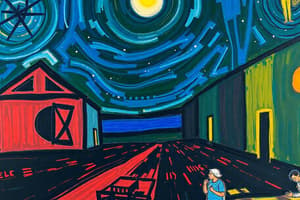Podcast
Questions and Answers
Explain the quote 'Our eyes were opened, but too late.' Where was the train at this point?
Explain the quote 'Our eyes were opened, but too late.' Where was the train at this point?
They weren't expecting to be taken out of Hungary into Germany and now it was too late to save themselves.
What does Madame Schater's nightmare foreshadow?
What does Madame Schater's nightmare foreshadow?
Her nightmare about a fire foreshadows their experience at Auschwitz.
How did some of the passengers quiet Madame Schater? What do their actions tell us about how people react to stressful situations?
How did some of the passengers quiet Madame Schater? What do their actions tell us about how people react to stressful situations?
They tried to place a wet rag on her forehead and told her she would find her husband and sons again. They think she has gone mad.
Where does the train stop?
Where does the train stop?
Flashcards are hidden until you start studying
Study Notes
Quote Analysis
- "Our eyes were opened, but too late" reflects the realization of the passengers' dire situation as they are taken from Hungary to Germany.
- The context signifies a moment of helplessness, where the opportunity for escape or defense has passed.
Madame Schater's Nightmare
- Madame Schater's recurring nightmare involves screaming about a fire, which serves as a significant warning.
- This ominous dream foreshadows the horrific experience the passengers will endure at Auschwitz, indicating imminent danger.
Reactions to Stress
- Passengers attempted to calm Madame Schater using a wet rag on her forehead, illustrating physical efforts to soothe her.
- They offered false reassurances about reuniting with her husband and sons, demonstrating a coping mechanism based on hope.
- These actions reveal a tendency to dismiss or misunderstand extreme stress responses, reflecting how people can react with either empathy or skepticism in chaotic situations.
Train's Destination
- The train ultimately stops at Auschwitz, marking the arrival at a notorious concentration and extermination camp during the Holocaust.
Studying That Suits You
Use AI to generate personalized quizzes and flashcards to suit your learning preferences.




